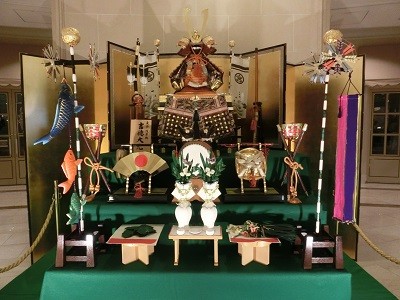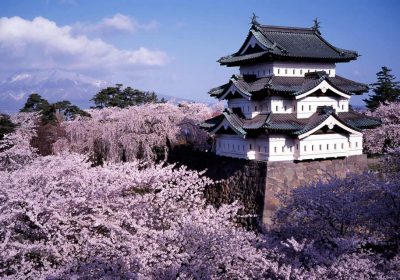Japan has 16 national holidays in a year. Some months have no national holidays, but in spring between late April and the beginning of May, there are four national holidays. Including Saturday and Sunday, it can be a week-long holiday season depending on the calendar. We call this period Golden Week. Let’s see what the Japanese do during this week, and how it can affect your trip to Japan.
Golden Week, a Time to Relax
April is a busy time of the year in Japan. The government’s and many companies’ fiscal year and the school year all start in April. It comes from an old tradition when rice cropping was the major industry in Japan. Rice cropping starts in April.
Students change their school or class, and many workers change their department in April. They need to get used to a new environment in the classroom or in the office, and they meet a lot of new people. So it is good timing for a bit of rest after a busy month.
Showa Day
April 29th is Showa Day. It was the birthday of Emperor Showa. When he was alive, this holiday was called ‘Emperor’s Birthday’. The government didn’t make it a normal day even after the death of the Emperor to keep Golden Week intact as a long holiday season.
May Day
May 1st is not a national holiday, but some labor unions organize meetings to demonstrate about their rights and demands on this day. The May Day event started in the early 20th century in Japan. They stopped their activities during the wartime, and after WW2 it became like a festival in which family members of the employees also participated.
But the number of participants has been decreasing because not many young people join the union. And even if they join, they want to have a long holiday instead of taking part in an event in the middle of the Golden Week.
Constitution Memorial Day
May 3rd is Constitution Memorial Day. It is the day to commemorate the enactment of the Constitution of Japan which started on May 3rd, 1947. The USA greatly influenced Japan’s new constitution because it was just after WW2. They prohibited Japan from having a military. Now it is called the peace constitution because of article 9 which mentions the renunciation of the war.
Green Day
May 4th is Green Day, which is a kind of new holiday. Green Day used to be April 29, which was a former Emperor’s birthday. After the death of the Showa Emperor in 1989, it was changed to Green Day because he loved nature. Then the government moved it to May 4th and April 29 became Showa Day named after Showa Emperor.
This was decided by the national government in order to increase the number of days off during Golden Week, inserting it between two existing national holidays. Japanese salaried workers are not willing to take personal holidays in general, but they take a day off if it is a national holiday. The government tries to give more free time to the workers this way.
Children’s Day
May 5th is Children’s Day. It used to be called Boys’ Day until 1947. There used to be strong discrimination between men and women, but things have been slowly improving since WW2. Children’s Day is one example. We hope for the healthy growth of the children on this day. Families with children often hoist ‘koinobori’, or carp streamers, for several days before Children’s Day.
The carp is a symbol of strength because of the following Chinese legend. A carp tried to go up the waterfall and when it reached the top, it transformed into a dragon. So, parents hoist the carp streamers hoping that their children will become as strong as carp. If they have a boy, they often decorate the figures of samurai in their homes, too.

There are a few more traditions on this day. People bathe in hot water with iris flowers. Iris is ‘shobu’ in Japanese, and the pronunciation has another meaning which is ‘match’. So it means that their children will win a match. It is also said that the strong smell of the iris will drive evil spirits away. Recently, doctors found out that hot water with iris stimulates healthy circulation and relaxation.
Kashiwamochi, rice cake wrapped in the oak leaf, is eaten on that day. Oak holds its leaves until next spring when new leaves grow. It is like they continue to have successors forever. It is a symbol of a long-lasting family.
Substitute Public Holidays in Golden Week
When a national holiday falls on a Sunday, Japanese people are lucky enough to have an extra holiday on Monday. We call it a substitute public holiday. Because we have four holidays during the Golden Week, there is a high chance to get this extra holiday. If you use oe or two paid holidays, you may even be able to get a holiday for more than 10 days.
Golden Week Travel Season
Many people travel during the Golden Week. Some go abroad and some go on a domestic trip. All the trains, airplanes, and expressways are congested and the prices skyrocket during this time. So, where are the good places to visit in this season? It is a good time to appreciate the fresh greenery of the forest or mountains. You can also see azalea flowers in many places.
Another popular destination is the northern part of Japan. Between late March and early April is cherry blossom season in Tokyo, Kyoto, and the southern cities. But if you go to Northern Tohoku and Hokkaido, you can enjoy cherry blossoms again during Golden Week! For example, Hirosaki in Aomori Prefecture is one of the most popular places for flower viewing because the combination of the old castle and cherry blossoms makes great scenery.

Your Japan Tour
As seasoned Japan experts, we can help you create your perfect Japan tour. If you’d like to travel during Golden Week or another Japanese holiday period we can advise you on the best places to go to avoid the crowds. Contact us to start planning your unforgettable holiday to this fascinating country full of once-in-a-lifetime experiences, culture, history, nature, and delicious food!